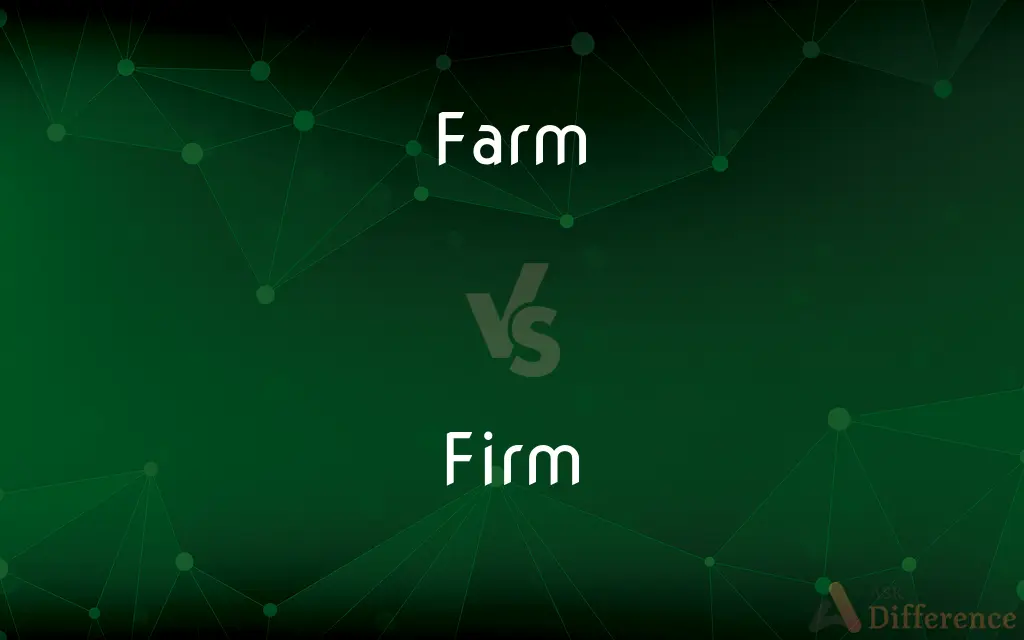Farm vs. Firm — What's the Difference?
By Tayyaba Rehman & Fiza Rafique — Updated on February 26, 2024
Farm focuses on agriculture, raising crops and livestock; Firm emphasizes business entities, providing services or products. Both play crucial roles in their sectors.

Difference Between Farm and Firm
Table of Contents
ADVERTISEMENT
Key Differences
A farm primarily engages in agriculture, producing food, fiber, and other goods by cultivating plants and raising animals. In contrast, a firm operates in the commercial sector, focusing on offering services or products to consumers. This fundamental distinction underpins their contributions to the economy and society, with farms ensuring food security and firms driving economic activity.
Farms are often located in rural areas to utilize large land areas for cultivation and livestock, firms can be found in various settings, including urban centers, where they access markets, talent, and infrastructure. This geographical difference reflects their operational needs and impacts on the local community and environment.
The workforce on a farm typically possesses skills in agriculture, such as crop production and animal husbandry, whereas a firm employs individuals with expertise relevant to its specific industry, such as finance, marketing, or technology. This specialization influences career paths and educational requirements for workers in both sectors.
Farms depend heavily on natural factors like weather, soil fertility, and water availability, making them more susceptible to environmental challenges. Firms, however, often contend with market-driven forces, including competition, consumer demand, and regulatory changes, which shape their strategies and success.
The ownership and management structure of farms can range from family-owned operations to large agribusinesses, whereas firms can vary from small enterprises to multinational corporations, reflecting a broad spectrum of governance models and organizational scales.
ADVERTISEMENT
Comparison Chart
Primary Activity
Cultivating crops and raising livestock
Providing services or products
Location
Predominantly rural
Urban to suburban, depending on industry
Workforce Skills
Agriculture-specific (e.g., crop production)
Industry-specific (e.g., finance, marketing)
Environmental Dependency
High (weather, soil, water)
Lower, market and regulatory influences predominate
Ownership and Management
Often family-owned or large agribusinesses
Ranges from small businesses to multinational corporations
Compare with Definitions
Farm
In technology, a collection of servers or machines working together.
The data farm handles massive online transactions.
Firm
In legal context, a partnership or company.
She works for a law firm downtown.
Farm
A location for renewable energy production, like a wind farm.
The wind farm generates power for the entire region.
Firm
Firmness or solidity in texture.
The mattress is too firm for my liking.
Farm
A place where specific types of animals are raised.
Their dairy farm has over 100 cows.
Firm
To make or become firm or compact.
Firm the soil around the plant after watering.
Farm
A land area used for growing crops and raising livestock.
The farm produced enough wheat to supply the local market.
Firm
Determined or resolute in action.
He remained firm in his decision despite opposition.
Farm
To engage in farming activities.
They farm organically, avoiding chemical pesticides.
Firm
A business organization selling services or products.
The firm launched a new software tool.
Farm
Be a farmer; work as a farmer;
My son is farming in California
Firm
A business concern, especially one involving a partnership of two or more people
A law firm
State support for small firms
Farm
A farm (also called an agricultural holding) is an area of land that is devoted primarily to agricultural processes with the primary objective of producing food and other crops; it is the basic facility in food production. The name is used for specialized units such as arable farms, vegetable farms, fruit farms, dairy, pig and poultry farms, and land used for the production of natural fiber, biofuel and other commodities.
Firm
A business enterprise.
Farm
An area of land and its buildings, used for growing crops and rearing animals
A farm of 100 acres
Farm workers
Firm
An unincorporated business, particularly a partnership.
Farm
Make one's living by growing crops or keeping livestock
He has farmed organically for years
Firm
A business partnership; the name under which it trades.
Farm
Send out or subcontract work to others
It saves time and money to farm out some writing work to specialized companies
Firm
A business enterprise, however organized.
Farm
Allow someone to collect and keep the revenues from (a tax) on payment of a fee
The customs had been farmed to the collector for a fixed sum
Firm
Members of a business organization that owns or operates one or more establishments;
He worked for a brokerage house
Farm
A tract of land cultivated for the purpose of agricultural production.
Farm
To cultivate or produce a crop on (land).
Farm
(obsolete) A fixed yearly amount (food, provisions, money, etc.) payable as rent or tax.
Farm
(historical) A fixed yearly sum accepted from a person as a composition for taxes or other moneys which he is empowered to collect; also, a fixed charge imposed on a town, county, etc., in respect of a tax or taxes to be collected within its limits.
Farm
(historical) The letting-out of public revenue to a ‘farmer’; the privilege of farming a tax or taxes.
Farm
The body of farmers of public revenues.
Farm
The rent of land, - originally paid by reservation of part of its products.
Farm
Workplace consisting of farm buildings and cultivated land as a unit;
It takes several people to work the farm
Farm
Cultivate by growing, often involving improvements by means of agricultural techniques;
The Bordeaux region produces great red wines
They produce good ham in Parma
We grow wheat here
We raise hogs here
Common Curiosities
What distinguishes a farm from a firm?
A farm is dedicated to agriculture, while a firm is a business entity focused on offering services or goods.
What skills are needed to work on a farm?
Skills in crop production, animal husbandry, and machinery operation are vital for working on a farm.
How do firms contribute to the economy?
Firms drive economic activity by creating jobs, innovating, and providing goods and services that consumers need.
What types of products do farms produce?
Farms produce a variety of products, including grains, fruits, vegetables, meat, dairy, and wool, depending on their focus.
Is agriculture the only activity on a farm?
While agriculture is the primary focus, some farms also engage in agritourism, education, and renewable energy production.
What makes a firm successful?
A successful firm often excels in innovation, market understanding, and efficient operations, adapting to consumer needs and economic changes.
How do environmental factors affect farms?
Environmental factors like weather and soil quality significantly impact farm productivity and operations.
Can a farm be considered a firm?
In broad terms, a farm can be considered a firm if it operates with a structured business model, focusing on profit from agricultural products.
Are all farms located in rural areas?
While most farms are in rural areas to utilize large land expanses, some small-scale operations, like urban farms, exist in cities.
Can individuals own firms?
Yes, individuals can own firms, ranging from sole proprietorships to shares in corporations.
What regulatory challenges do firms face?
Firms navigate a complex landscape of legal, financial, and industry-specific regulations to operate legally and competitively.
What are the common challenges faced by farms and firms?
Both face challenges like market competition, regulatory changes, and the need for sustainable practices, albeit in different contexts.
How do technological advancements impact firms?
Technological advancements can streamline operations, enhance product offerings, and open new markets for firms.
How does globalization affect farms and firms?
Globalization expands markets and competition but also introduces challenges like regulatory compliance and global supply chain management.
Can a firm operate in the agricultural sector?
Yes, agricultural firms operate within the sector, focusing on agribusiness services, biotechnology, and supply chain management.
Share Your Discovery

Previous Comparison
Chomo vs. Chimo
Next Comparison
Volume vs. ToneAuthor Spotlight
Written by
Tayyaba RehmanTayyaba Rehman is a distinguished writer, currently serving as a primary contributor to askdifference.com. As a researcher in semantics and etymology, Tayyaba's passion for the complexity of languages and their distinctions has found a perfect home on the platform. Tayyaba delves into the intricacies of language, distinguishing between commonly confused words and phrases, thereby providing clarity for readers worldwide.
Co-written by
Fiza RafiqueFiza Rafique is a skilled content writer at AskDifference.com, where she meticulously refines and enhances written pieces. Drawing from her vast editorial expertise, Fiza ensures clarity, accuracy, and precision in every article. Passionate about language, she continually seeks to elevate the quality of content for readers worldwide.














































